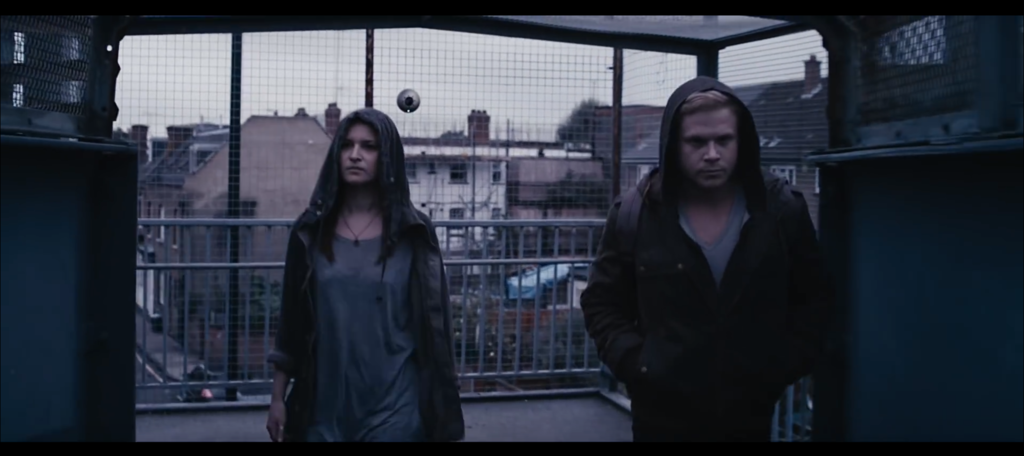
Figure 1. Jess (Holly Georgia) and Lee (Johnny Sachon) are followed by a surveillance drone in Shadows (Inspired Pictures, 2015). youtube.com
In film, there are many depictions of futuristic, fictional worlds that exist under oppressive corporate, bureaucratic, technological, or philosophical control, otherwise known as dystopias. Although each representation contains different messages, they share many of the same themes and examine how current societal problems can have dire future consequences. One theme, totalitarian control, is represented in many dystopian films because it is imminent or already present in several countries around the world. The three dystopian films that are being screened today, Pumzi (2009), Shadows (2015), and Monsoons Over the Moon (2015), embody the theme of totalitarianism and serve as a warning for societies in the real world that exist under complete government control.
Wanuri Kahiu’s short sci-fi film Pumzi not only gives insight into the consequences of an international water war, but also shows how a nation’s government can easily take control of the citizens’ lives in the wake of environmental devastation. The film depicts a secluded and heavily controlled community of people living under harsh conditions. Surrounded by a seemingly unending desert, the citizens of the Maitu community spend their days generating power through kinetic energy, and their only reward is a small ration of precious water that must be conserved and reused in every possible way. The dystopia exists under the illusion of a perfect society; the citizens work together to power a community that runs on one hundred percent renewable energy. However, certain details suggest that the community is far from a utopia. For instance, water rationing is controlled by armed government officials, government propaganda is broadcasted on loudspeakers within the community space, individuals are reprimanded for individualistic thinking, and leaving the community is prohibited. These are characteristics of a dystopian society, and they illustrate how the government controls nearly every aspect of the citizens’ lives. The film draws attention to the fact that an international water war may be imminent, and that the government would take absolute control in such a crisis.
Shadows, directed by Luke Armstrong, is a quintessential dystopian film that criticizes government control. Unlike Pumzi, this short sci-fi film depicts a future that seems eerily similar to present day. Except for the government surveillance drones (Figure 1) and the various electronic tracking devices the government uses to monitor the citizens, the world has not changed drastically in the years leading up to 2037, when the film is set. Even the protagonists, Lee (Johnny Sachon) and Jess (Holly Georgia), look like normal young adults living in present-day United Kingdom. It becomes clear that the society in the film is a totalitarian state when Lee and Jess put their plan to start a rebellion into action by destroying the drones and infecting them with a virus. Lee sums up the theme of government control in the last few moments of the film when he says, “They’re watching you too. They’re always watching.”
Monsoons Over the Moon, a film that is in both English and Swahili and is shot in black and white, relates to the current political themes in the country it was made. Director Dan Muchina warns Kenyan society about the dangers of totalitarian government by highlighting the similarities between the imagined dystopian society and the real world. The film unfolds through the perspective of a girl named Shiro (Anita Kavuu-Ng’ang’a). From her point of view, the viewer sees the violence and secrecy that government control inspires. For example, her life is threatened by men who work for the government. Additionally, she is informed of a valuable book written by an antigovernment gang known as the Monsoons that spreads uncensored ideas. Because dissent against the government is criminal, the citizens of the society are caught in a loop of restricted freedom, constant surveillance, and fear. The similarities between the film’s setting and characters and Kenya’s situation and population suggest that if the current political trends in Kenya continue, Monsoons Over the Moon will be an accurate representation of society in the future.
While Pumzi, Shadows, and Monsoons Over the Moon have different storylines, aesthetics, and messages, they all share a common theme of totalitarian control. As dystopian films, they serve as warnings to society about the dangers of oppressive government control and comment on the state of current political systems. Although the films do not provide solutions to the issue of totalitarian control, they still achieve their goal by showing viewers what could happen in the future.
Author Biography
Ashley R. Spillane is an Honors student at the University of North Carolina Wilmington majoring in Film and minoring in Digital Arts. When she is not watching, making, or writing about films, she enjoys reading, painting, and experimenting with graphic design.







































